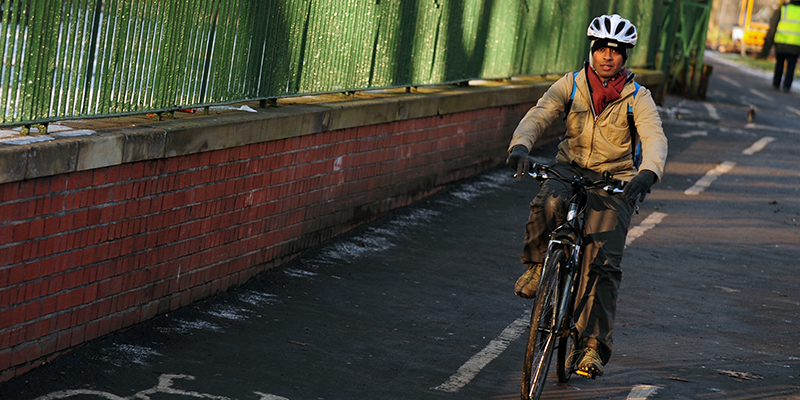
The COVID-19 pandemic may be the ‘tipping point’ for people to start cycling and walking to work, Leicester researchers have said.
More than 1,000 people from Leicester and the surrounding areas took part in a survey by the Leicester Changing Diabetes project, made up of researchers from the University of Leicester and Leicester’s Hospitals.
The findings reveal that coronavirus has led to a shift in attitudes towards commuting. The research also found that:
- While those who commute by car often have jobs and personal commitments that mean they rely on their vehicle, the COVID-19 pandemic has made some drivers reassess their health and lifestyle.
- One in 10 people who drove to work prior to the pandemic now intend to ‘actively commute’ (walk or cycle) to their jobs, with 6.5% of respondents now planning to cycle and 3.6 per cent intending to walk.
- Of those who previously relied on public transport, 11.5% will now cycle to work instead and nine per cent will walk, but perceived concerns about COVID-19 and safety, cleanliness and space on public transport mean more bus and train passengers may also start commuting by car.
- Concerns about road safety, volume of traffic, restrictive working patterns and lack of amenities, such as bike storage and shower facilities at their place of work, were among the barriers some respondents listed about using a bike as an alternative mode of transport. They expressed a desire for ‘better’ cycling infrastructure and joined-up cycle lanes.
- Respondents recognised that changing to walking or cycling would be good for their physical health and bring environmental benefits.
Researchers are highlighting how city and town councils, urban planners, public health specialists and workplaces now have a unique and time-limited opportunity to tackle the barriers that deter some people from adopting active travel, at a time when they are particularly conscious of their health.
Lead researcher Dr Deirdre Harrington, Lecturer in Physical Activity and Health at the University of Leicester and the Leicester Diabetes Centre, said: “The COVID-19 pandemic has forced us all to think about the state of our health. Encouraging people to cycle or walk to work supports social distancing and introduces valuable physical activity into our day.
“We need stakeholders to come together to form interventions which will increase capability, opportunity and motivation for cycling and walking. If people start adopting new activity-led ways to get to work, we would all benefit from less congestion and air pollution and improved physical and mental health in the longer-term.”
Leicester has already started tackling the issues head on during the pandemic.
Commenting on the findings, deputy city mayor for environment and transportation, Councillor Adam Clarke, said: “This research shows that more and more people want to cycle or walk to work. It supports our own findings, which show an 11 per cent increase in cycling across the city last month compared to June 2019, with an increase of 18 per cent in cycling numbers during the week commencing 13 July 2020.
“Over the last 10 weeks we’ve created 11 miles of pop-up cycling and walking routes, as well as help more than 1,000 people through our Leicester Bike Aid scheme, providing personalised travel plans, bike-fixes and bike loans for key workers. Our quick and innovative work has received national praise.
“Our COVID-19 Transport Recovery Plan, published at the end of May, sets out how we will use our transport systems to help Leicester’s economy recover while meeting our environmental goals. We’ll continue to think radically and act quickly when it comes to active travel, so that Leicester becomes a healthier, greener and stronger city after coronavirus.”
Dr Harrington added: “COVID-19 is going to exist in tandem with other public health crises, such as mental health and obesity, so there has never been a better time to shine a spotlight on our health and take action to encourage active travel.”
Leicester Changing Diabetes is a joint working project between Leicester Diabetes Centre and Novo Nordisk and is part of a wider global programme that is supporting cities to address type 2 diabetes and improve the health of their populations. It is supported by the National Institute for Health Research (NIHR) Leicester Biomedical Research Centre – a partnership between Leicester’s Hospitals, the University of Leicester and Loughborough University.